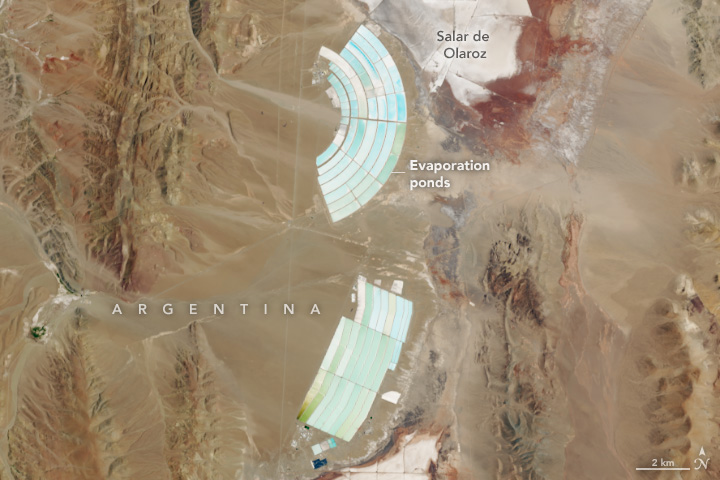
Mining Lithium in Argentina
Downloads
- lithiumine_oli_20240114__lrg.jpg (888x592, JPEG)
Metadata
- Sensor(s):
- Landsat 8 - OLI
- Data Date: January 14, 2024
- Visualization Date: March 7, 2024
Some of the largest known deposits of lithium—a soft silvery metal that powers batteries in cell phones, laptops, and electric vehicles—lie in one of the driest places on Earth. Much of the surveyed deposits of this metal are located in the arid salt flats of South America, where Chile, Argentina, and Bolivia meet.
The Altiplano-Puna Plateau is an elevated 500,000-square-kilometer area in the Central Andes, and the second highest plateau on Earth after the Tibetan Plateau. Several climatic and geologic factors converged in these dry plains to create large underground lithium deposits.
The Altiplano-Puna sits on one of Earth’s largest known reservoirs of active magma. Although the area receives very little precipitation (less than 30 centimeters [12 inches] a year), hydrothermal fluids associated with this volcanic activity naturally replenish underground aquifers. Over time, rocks containing trace quantities of lithium have weathered causing the metal to build up in the aquifers. According to the U.S. Geological Survey, about half of the world’s measured lithium resources are in these underground deposits in Bolivia, Argentina, and Chile, an area known as the “lithium triangle.”
The image above, acquired by the OLI (Operational Land Imager) on Landsat 8, shows lithium mines in northwestern Argentina’s Jujuy province, near the country’s border with Chile. The light blue evaporation ponds of the mines stand out. The mines are located just south of a large salt flat, known as the Salar de Olaroz.
To harvest the lithium, wells are tapped into the lithium-rich brine beneath the surface. They shunt the brine toward rectangular evaporation ponds lined with plastic. Once there, the briny mixture stays in the ponds for months at a time, where sunshine and wind separate out lithium, salt, and other substances through evaporation. This lithium-rich solution is then processed into lithium carbonate or lithium hydroxide.
Landsat images show the mine immediately adjacent to Salar de Olaroz has expanded several times since 2016, and it is now one of the largest lithium mines in Argentina. In 2018, evaporation ponds were developed for another mine 2 kilometers to the south. Global production of lithium has increased almost ten-fold over the last two decades, from approximately 15,000 metric tons in 2001 to 146,000 metric tons in 2022.
References & Resources
- NASA (2020, May 19) Lithium Comes From Exploding Stars. Accessed March 7, 2024.
- NASA Earth Observatory (2023, January 2) Racing to Mine Lithium. Accessed March 7, 2024.
- NASA Earth Observatory (2019, April 27) Lithium Harvesting at Salar de Uyuni. Accessed March 7, 2024.
- NASA Earth Observatory (2010, May 17) Panorama of Central Andes Mountains, Salar de Arizaro, Argentina. Accessed March 7, 2024.
- Sterba, J.,et al. (2019) Lithium mining: Accelerating the transition to sustainable energy. Resources Policy, 62, 416-426 .
- Tapia, J., et al. (2022) The Unique Altiplano-Puna Plateau: Environmental Perspectives. Journal of South American Earth Sciences, 115, 103725.
- U.S. Geological Survey (2024, January) Mineral Commodity Summaries, Lithium. Accessed March 7, 2024.
NASA Earth Observatory image by Wanmei Liang, using Landsat data from the U.S. Geological Survey. Story by Emily Cassidy.
This image record originally appeared on the Earth Observatory. Click here to view the full, original record.